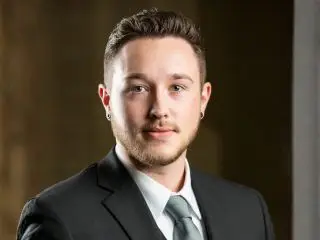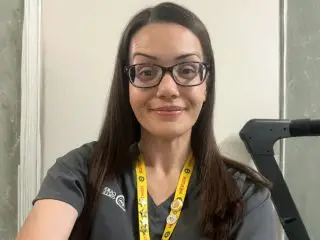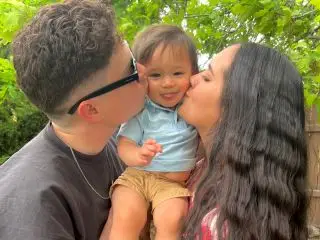 Like most people who have lived for 50 years, Rudolph “Rudy” Waterman has had his share of successes—and failures. But what happened earlier this year was especially humbling. Rudy, a former prison corrections officer who has worked as a caregiver and certified nursing assistant since 2012, was on track to graduate in May with his Associate Degree in Nursing from Carrington’s Mesa, Arizona campus. He’d even been selected to be a featured speaker for the cap and gown commencement ceremony. His family and friends had blocked the date on their calendars, and Rudy was looking forward to celebrating his success. “But then everything just sort of fell apart,” Rudy recalls. “At the time, I was working three jobs, going through a divorce, and trying my best to keep up with my school work. I felt like I was always playing catch-up because there was so much going on. I didn’t have a spare minute to just breathe. There comes a point when something’s got to give, and it did. I fell five points short of passing my Medical Surgical 4 class, which meant I wasn’t going to graduate with my class. I was tired, embarrassed, and disappointed when I learned the news.” We talked with Rudy about what happened next, why he wants to be a nurse, and the lessons he’s learned while turning obstacles into opportunities.
Like most people who have lived for 50 years, Rudolph “Rudy” Waterman has had his share of successes—and failures. But what happened earlier this year was especially humbling. Rudy, a former prison corrections officer who has worked as a caregiver and certified nursing assistant since 2012, was on track to graduate in May with his Associate Degree in Nursing from Carrington’s Mesa, Arizona campus. He’d even been selected to be a featured speaker for the cap and gown commencement ceremony. His family and friends had blocked the date on their calendars, and Rudy was looking forward to celebrating his success. “But then everything just sort of fell apart,” Rudy recalls. “At the time, I was working three jobs, going through a divorce, and trying my best to keep up with my school work. I felt like I was always playing catch-up because there was so much going on. I didn’t have a spare minute to just breathe. There comes a point when something’s got to give, and it did. I fell five points short of passing my Medical Surgical 4 class, which meant I wasn’t going to graduate with my class. I was tired, embarrassed, and disappointed when I learned the news.” We talked with Rudy about what happened next, why he wants to be a nurse, and the lessons he’s learned while turning obstacles into opportunities.
So then what happened? You were two months away from graduating—and then suddenly you weren’t. What did you do?
Once the shock wears off, you have to decide whether you’re going to quit or keep going. There was no other choice but to take a deep breath, refocus my energy, and take the class again. During that time, I read a book called Failing Forward: Turning Mistakes Into Stepping Stones for Success. It reinforced my belief that setbacks ultimately make you stronger. You’ve got to get yourself unstuck and focus on that next step. Within three weeks, I was back in class, taking the course I’d failed. It was with the same teacher but with a new group of students, so it felt strange at first. But before long, I got my momentum and balance back. Even though it’s not an experience I would recommend, I learned a lot about life—and about myself—by going through it. I also completed the class successfully, which felt great.
What is it about nursing that appeals to you as a career?
I’ve always had a caregiver’s personality, but I never considered a nursing career when I was younger. When I was a kid, I think most people still considered nursing a job for women. I just never thought it was a career path that was open to me. I’m grateful that people’s minds and hearts have changed because it’s a career I think I’m good at and a field in which I know I can make a difference. When a friend of mine encouraged me to think about becoming a certified nursing assistant years ago, I realized it was not only something that interested me but something I could excel in. As it turns out, it has been. Over the past 10 years, I’ve worked as a caregiver or CNA in a nursing home, mental health clinic, behavior center, and a hospital.
What has your experience at Carrington been like?
It was a real learning experience in every way imaginable. I met a lot of phenomenal people—both faculty and fellow students—and I really value the education I got at Carrington. It wasn’t always easy, but it’s definitely been worth it.
You once worked as a state correctional officer in a prison. That seems like an entirely different world than nursing—or are there similarities?
Whether you’re working as a correctional officer or a nurse, you’re being of service and addressing the needs of other people. I’ve always believed that how you approach another human being, whether they’re incarcerated or in the hospital, almost always impacts the response you’re going to receive from that person. In both settings, I’ve done my best to approach every situation with a commitment to communication and compassion. When you respect other people and treat them with dignity, it almost always makes a difference.
If you had a friend who was considering enrolling in Carrington’s ADN program, what would you tell them?
I’d encourage them to focus on learning the material and getting the most out of the program as they possibly can. Some days will be better than others. Some classes will be better than others. There will be times when you’ll feel like everything is going great, and other times when you’ll wonder if you’ll make it. That was certainly true for me. But when you graduate, you’ll find that the experience will have prepared you for the kind of career and the kind of life you want for yourself.
You have a 21-year-old son. What do you think he’s learned by watching his dad return to college and earn his ADN?
My son is a hard-working young man. I’m hoping what I’ve accomplished reinforces for him that a strong work ethic and determination eventually pay off.
What do you plan to be doing five years from now?
First, I’d like to gain some experience as a registered nurse. Then I want to return to school. In five years, I plan to have my BA and MA and work as a nurse practitioner. At 50, I’m not a kid, so I’m really focused on keeping the momentum going and making the time count.
What have you learned about yourself during the process of completing your degree?
I’ve learned a lot about the power of patience and perseverance. Nursing school is challenging. It requires sacrifices and lots of adjustments along the way. You really need to keep your eye on your goal. As it worked out, I graduated in July instead of April. And instead of speaking at the May graduation ceremony, I’ve been asked to speak at the ceremony in December. It feels great to be ending this journey on a high note. When you don’t give up, great things can happen. It might not always be on the timetable you anticipated or wanted, but I can tell you from experience that it’s worth the wait.



